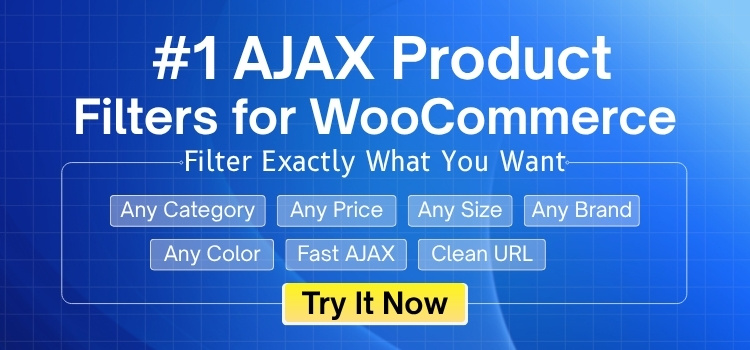Fast and responsive AJAX filters are key to handling large WooCommerce stores effectively. With thousands of products, your store needs smart filtering to keep users engaged. Even brief delays can drive visitors away. You might already be wondering how to optimize AJAX filters for large WooCommerce stores?
Optimize AJAX filters for large WooCommerce stores by using better database queries, smart caching, lightweight design, and the right plugin like Dynamic Ajax Product Filters. Clean JavaScript, limit filter choices, and test regularly to keep filtering fast.
If you’re curious about improving filter performance without slowing down your store, this article is for you. Every section breaks down useful tips and explains them clearly. You’ll find everything you need to know to make AJAX filters run better on large WooCommerce stores.
How to Optimize AJAX Filters for Large WooCommerce Stores?
Large WooCommerce stores often struggle with slow filters, especially when lots of products and categories are involved. If your store feels laggy during product filtering, you’re not alone. Let’s look at simple ways to fix this easily.
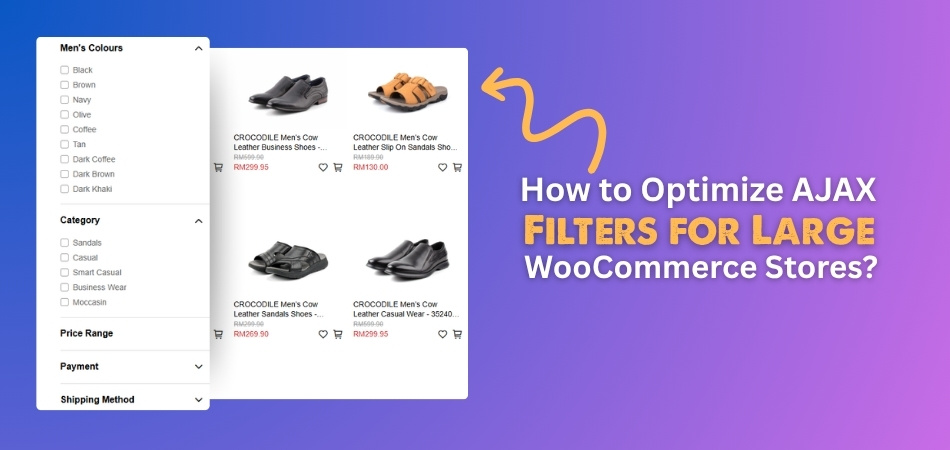
Use Better Queries
Fast product filtering depends a lot on how your site talks to the database. If the queries take too long, everything slows down. That’s why it’s important to reduce unnecessary database calls and only fetch what’s needed. When filters are applied, your site should avoid loading every product at once. Focus on getting just the right data. Cleaner queries make your filters quicker, and shoppers won’t get stuck waiting for results.
Choose the Right Plugin
Not all filter plugins work well with large stores. Some load slowly, and others don’t handle many products well. Picking a plugin that’s made for bigger shops can really help. For example, when you’re already using a large catalog, it is essential to use a plugin that supports the WooCommerce Ajax product filter plugin. It’s designed to handle product filters smoothly without stressing your site too much. So, having the right tool quietly improves the whole experience.
Add Smart Caching
Filters can be heavy on the server if they reload everything each time. To avoid that, caching is your friend. Store some results ahead of time, so your site doesn’t work from scratch every time someone clicks a filter. It helps reduce loading time and keeps things smooth. You can use object caching or even page fragment caching to handle this part better. It’s a small trick that makes a big difference.
Clean Up JavaScript
Slow filters can also be caused by messy or heavy JavaScript. If your scripts are too large or not written well, they can slow down everything on the page. Make sure your site uses only what it needs. Minify the code, remove extra stuff, and always test how fast things respond when filters are clicked. A cleaner setup means the browser can load and show results faster, making your store feel quicker.
Keep the Design Light
Heavy page designs can add extra load when filters are used. If your site tries to do too many things at once, filters may take longer to show results. Use simple designs, avoid too many animations, and don’t overload the page with popups or extra content. A clean layout helps filters run faster and keeps your customers from getting frustrated with slow pages.
Limit Filter Choices
Too many filter options can confuse users and slow down performance. Stick to what really matters—like price, color, size, or brand. This keeps things easier for users and also lighter for your site to handle. When there are fewer filter choices, the server doesn’t have to process as much, and the page can load faster. It’s all about finding the right balance between helpful and simple.
Test and Monitor
Just setting things up isn’t enough. You should keep testing how your filters perform. Use tools that show how long your pages take to load, and check if anything feels slower after changes. Regular checks help catch problems before they grow. Also, keep an eye on which filters are used the most—that way, you can focus on improving just those parts instead of everything.
Speeding up your filters can really change how people feel about shopping on your site. It keeps things simple, quick, and stress-free. You don’t need to change everything—just a few smart tweaks can help. Start small, test often, and watch your store run better.
Why AJAX Filtering Performance Matters for Large WooCommerce Stores?
When a store has thousands of products, finding the right one matters. Filters help people search faster, but slow ones do the opposite. If filters take too long, users leave the site quickly. That’s why it’s important to understand how filter speed really affects your store.
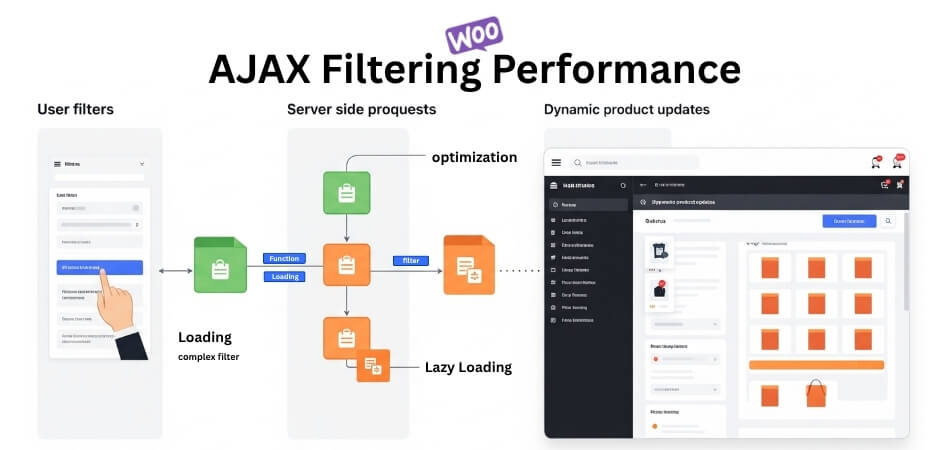
Slower Sites Lose Shoppers
Most users won’t wait for filters that load slowly or freeze up often. They expect quick results, even on large WooCommerce stores with many items. When filters lag, people usually close the tab and leave. That’s how you lose visitors before they even view your products. Fast filters make your site feel smooth and easy. It keeps people interested and more likely to stay longer. A faster experience leads to better chances of shopping.
Poor Filters Hurt Sales
Too many clicks and slow filters make shopping feel like hard work. When users can’t sort products fast, they stop looking altogether. Even if your products are good, a bad filter ruins the flow. A smooth, fast filter makes browsing simple and less stressful. That means more people find what they need without any trouble. More happy shoppers usually means more sales in your store. A smart filter keeps people moving toward checkout.
First Impressions Matter
Most people decide quickly if they like a site or not. If filters don’t work well, they think the whole site is broken. That first moment can make or break your store’s success. When everything loads fast, it feels easy and professional. People stay longer when they enjoy using your site. A good filter gives them that feeling right away. That first smooth experience builds trust and keeps them exploring products.
Big Stores Need Smart Filters
Large stores need faster filters to manage all the product data easily. More items mean more work for filters behind the scenes. When filters load quickly and efficiently, users are more likely to interact with layered navigation tools, such as category selectors. Understanding the benefits of using product category filter in WooCommerce site is essential when planning a performance-first AJAX filtering system. It helps users narrow down results fast. That makes browsing large stores a better experience overall.
Better Filters Boost Conversions
People are more likely to buy when filters work smoothly every time. A fast filter means less time wasted and more items viewed quickly. That leads to more clicks on the “add to cart” button. Clean, working filters help customers find what they really want. It also helps reduce confusion with large catalogs and product lists. Every smooth filter action brings shoppers closer to buying. That’s how good filters increase your store’s conversion rate.
Fast filters improve more than just loading time—they improve the whole store. They keep shoppers happy, focused, and ready to make a purchase. With smoother filters, stores feel easier and more fun to use. Fixing slow filters can be the smartest move you’ve ever made.
Common Performance Bottlenecks in Large WooCommerce Stores for AJAX Filters
Growing WooCommerce stores often become heavier behind the scenes. As product numbers increase, filters can slow down, causing noticeable delays for users. Solving this starts with identifying where performance issues typically begin. Let’s break it down clearly.
- If your database isn’t using proper indexes, every filter request takes longer to find the right data, slowing things down.
- Some themes add too many scripts and styles, which makes the filter load slower and affects the full site’s speed.
- Filters that run on every page load without caching the results can make your store feel heavy and slow.
- Using multiple filter plugins together can cause conflict and double the amount of work for each filter click.
- Large product catalogs without any data cleanup can make filters search through too much, which delays the results.
- Loading all filter options at once, instead of only the needed ones, increases page weight and time.
- Too many product variations per item can create huge data chunks, which can slow down AJAX filtering.
- Filters that use outdated or poorly coded JavaScript can freeze or delay filter results, especially on mobile.
- Plugins that call external files too often increase the load time and break the smooth filtering flow.
- Running filters on shared hosting with limited server power will usually lead to very slow results under traffic.
A fast WooCommerce store makes people want to stay and shop longer. Fixing common filter problems helps your store work better without confusing users. Start with simple changes, and you’ll quickly notice a big difference.
How to Reduce Server Load When Using AJAX Filters for Large WooCommerce Stores?
Heavy filter use on a large WooCommerce store can quickly overload your server. This slows down the site and causes shoppers to lose patience. Simple steps can prevent this and keep everything running smoothly. Let’s look at how to reduce the load from filters on your server.
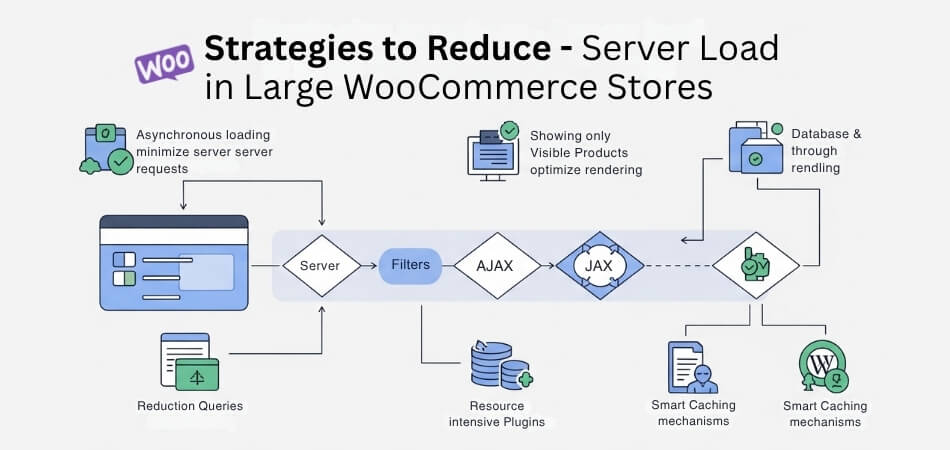
Use Asynchronous Loads
One of the best tricks is loading things without waiting for the full page. Filters should only pull in results without refreshing everything else. This helps the server do less work and saves time as well. It feels smoother for users and keeps the site faster overall. Smaller requests are easier to handle and won’t slow down the whole store. That way, even during busy times, your store stays quick and steady for everyone.
Show Only Visible Items
It’s not helpful to load every product if most won’t be seen. Focus on showing only the items that are needed at that moment. This makes the filter lighter and gives faster results. Your server doesn’t waste time loading hundreds of hidden products. Just showing what’s needed helps free up space and keeps things fast. Plus, users will still find what they want easily without delays.
Limit Extra Queries
Sometimes filters run too many small tasks in the background without a reason. These extra database checks slow things down and use up resources. It’s better to stop the ones that don’t give useful results. Filters should only check for what’s really needed. To further reduce server processing and prevent redundant queries, you can also optimize permalinks using AJAX product filters, ensuring clean URLs that don’t trigger full-page reloads or additional database calls.
Avoid Heavy Plugins
Many plugins are useful, but some add too much pressure on your site. When filters rely on bloated or poorly written plugins, the server struggles more. Try to use lightweight tools that are made for large stores. A simple plugin that does one job well is better than one trying to do everything. If your filters feel heavy, it may be time to switch to something better built.
Enable Smart Caching
Filters often pull the same product list again and again. Instead of doing that every time, store the results for later use. This saves the server from repeating the same task over and over. Caching helps give faster results while keeping the load low. It also makes filters feel faster for users because the results show instantly. Even simple caching tools can make a big difference in large stores.
Even the biggest WooCommerce store can run smoothly with the right steps. If filters feel slow, the server may just need a lighter load. Use a few smart tricks, and you’ll see things improve fast. Keep it simple, and your store will thank you.
How to Choose the Right AJAX Filter Plugin for Large WooCommerce Stores?
Finding the right filter plugin for a big WooCommerce store can feel tricky. Some plugins may look great, but they slow things down later. A good one should work fast and be simple to use. Let’s explore what really matters before choosing one.
Easy to Use
A plugin should be simple to set up and not feel confusing. If it takes too many steps just to add one filter, it’s probably not the right fit. Look for one that works right after install and gives clear options. The easier it is to use, the quicker your store gets faster filters. You won’t need much help, and changes will be smoother in the future.
Fast Performance
The plugin must not slow down your store, especially with lots of products. Some plugins take too much time to load filters, which annoys users. A good filter plugin keeps your site fast even when the catalog is huge. Always test the filter speed before using it fully. Quick filters make the shopping experience feel smooth and easy for everyone.
Works With Themes
Not all plugins work well with every theme out there. If the filter doesn’t match your theme or breaks the layout, it creates problems. Choose a plugin that says it works with your theme or has good support. It should blend in without needing too many fixes. That way, you don’t have to spend extra time making it look right.
Supports Custom Taxonomies
Big stores often use custom product labels like “Material,” “Use Type,” or “Style.” Make sure the plugin lets you create filters based on these custom fields. If it only supports basic categories or tags, it may not be enough for complex setups. More control means a better browsing experience for shoppers.
Lightweight Code
A heavy plugin with bloated code can slow your store even before filters are used. Pick one that’s built with performance in mind and doesn’t load unnecessary scripts. Clean code means faster loading and fewer bugs. Your store stays quick, even as more products and features are added.
Mobile Friendly
A lot of people shop on phones now, so your filters must work there too. The plugin should look clean and run smoothly on small screens. If buttons don’t work or filters look messy on mobile, users will leave. Make sure the plugin feels just as good on mobile as it does on desktop. This keeps everyone happy, no matter how they shop.
Good Support and Documentation
Even the best plugins can cause issues sometimes. A plugin with clear documentation and a responsive support team can save you hours. Look for one with how-to guides, setup help, and fast replies to user questions. That way, you’re never stuck when something goes wrong.
Regular Updates
Technology changes fast, so your plugin must be updated often to keep working well. A plugin that hasn’t been updated in a year might cause problems. Check the plugin details and see how often updates are made. Active plugins stay secure, work with new WooCommerce versions, and get bug fixes quickly. This helps your store run better over time without major issues.
Key Recommendation Plugin Lists for 2025
Choosing the right filter plugin can make a big difference for large stores. Below are some of the top options in 2025 that are fast, flexible, and built to handle heavy product loads smoothly.
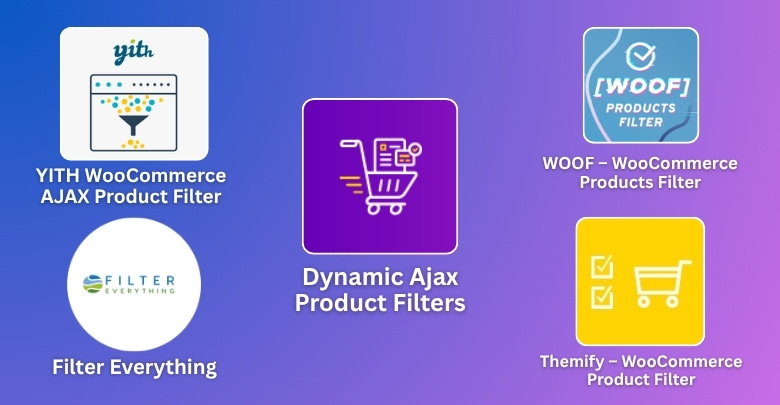
Dynamic Ajax Product Filters Plugin for WooCommerce
This one is highly recommended because it works super fast on big stores. It has clean filter styles, loads results quickly, and doesn’t slow your site down. You also get a lot of control over how filters look and behave. It’s perfect for stores with many products and works great on both desktop and mobile.
WOOF – WooCommerce Products Filter
This plugin gives lots of filter options like checkboxes, sliders, and dropdowns. It supports big product lists without crashing the site. It also works well with most themes and has good flexibility. WOOF is a solid choice if you want custom filter layouts without coding anything.
YITH WooCommerce AJAX Product Filter
It’s a reliable filter plugin that looks modern and feels easy to use. It supports color swatches, price sliders, and much more. YITH keeps things simple while handling product filters quickly. It’s great for users who want fast filters with clean design options.
Filter Everything
This plugin gives deep filtering for every part of your store. It even lets you filter blog posts, pages, and product types. It’s lightweight and handles large product databases better than most. If you need full control across your site, this one’s worth trying.
Themify – WooCommerce Product Filter
If you’re using a Themify theme, you’ll like how naturally this plugin fits in. It looks clean, works smoothly, and feels like a perfect match. While it’s not the fastest for very large stores, it still performs well and is easy to manage. Perfect if you’re using other Themify tools.
A strong filter plugin can make your store faster, cleaner, and easier to use. Always check performance, design match, and mobile support before deciding. Picking the right one will save time and give better results.
FAQs About How to Optimize AJAX Filters for Large WooCommerce Stores?
Below are some of the most common questions people have when trying to improve AJAX filter performance on large WooCommerce stores. These answers will help clear up confusion and offer simple tips that make a big difference.
Does Hosting Affect AJAX Filter Speed?
Yes, your hosting plays a big role in how fast your filters work. Shared hosting may not give your site enough power when many users visit. A stronger hosting plan, like VPS or cloud hosting, will handle filter requests better. If your store is large, good hosting can prevent slowdowns during filtering.
Should I Use a CDN with AJAX Filters?
Using a CDN can help your store load faster overall. It doesn’t directly speed up AJAX filters, but it reduces pressure on your server. Static parts like images, scripts, and styles are handled by the CDN. This leaves more space for the server to handle AJAX requests quickly.
Can Too Many Plugins Slow Down AJAX Filters?
Yes, too many plugins can slow your filters down a lot. Some plugins run in the background and make extra database calls. This puts more work on your server, which affects AJAX filter speed. Keep only the plugins you really need and remove the rest.
Do Product Tags Affect Filter Performance?
Product tags don’t directly slow down filters, but too many can clutter things. If your filter system includes tags, it may take more time to show results. Try to use tags only when they’re helpful to shoppers. Clean, focused tagging helps keep filters fast and simple.
How Do I Know If My Filters Are Too Heavy?
You might notice delays when filters load or refresh products. You can also use performance tools to check how long AJAX requests take. If requests are slow or spike under traffic, the filters are too heavy. Testing with different users or devices can also reveal slow spots.
What Is Lazy Loading in AJAX Filters?
Lazy loading means only loading things when needed, not all at once. In filters, this could mean loading more products only when the user scrolls down. It reduces the amount of data loaded at the start, helping speed things up. This is a great trick for large stores with lots of items.
Is It Okay to Use Third-Party Filter Templates?
It depends on how well the template is built. Some third-party templates are heavy and filled with extra code. This can slow down filter speed or break other site parts. Always test them first and choose ones made for performance.
Can Custom Code Improve Filter Speed?
Yes, custom code can help if written properly. You can remove unnecessary tasks or simplify how filters work. This reduces the work your server has to do each time a filter runs. But make sure your code is clean and well-tested.
Do Categories and Filters Work Better Together?
Using filters with clear categories helps users find products faster. But adding too many layers can confuse shoppers and slow down filters. Keep the categories simple and pair them with useful filters like price or color. This balance makes everything run smoother.
Should I Use Pagination or Infinite Scroll with Filters?
Both work, but each has pros and cons. Pagination splits results into pages, which is easier on the server. Infinite scroll loads products while users scroll, which feels smooth but can slow down if not managed well. For large stores, smart pagination is usually safer and faster.
Bottom Line
Making AJAX filters run smoothly on big WooCommerce stores doesn’t have to be hard. With the right plugin, fast database queries, simple layout, and proper caching, you can reduce slowdowns and improve user experience. So, how to optimize AJAX filters for large WooCommerce stores? The answer is to focus on speed, clean design, and smart tools that handle your store’s size well.
As a final tip, keep testing your filters, remove plugins you don’t need, and always stay updated. Your store will perform better, and your users will shop more comfortably. Keep things light, clean, and focused. Wishing you all the best as you build a faster and smarter WooCommerce store!
